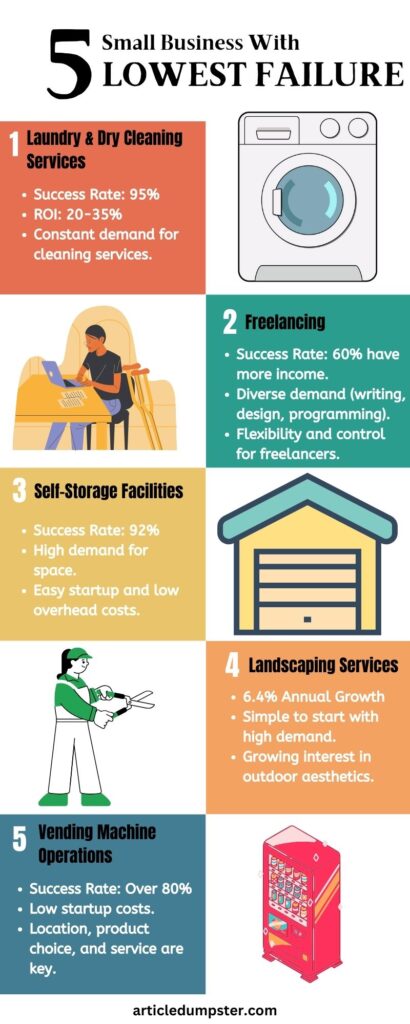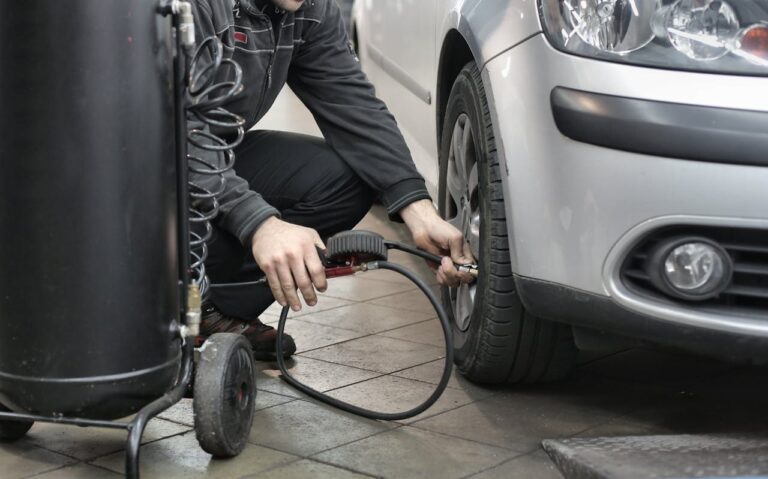Entrepreneurs, the risk-takers of the business ecosystem, often find themselves in a conundrum – which kind of small business to embark on that offers the best odds of success? The startup journey teems with uncertainty, and choosing small businesses with the lowest failure rate is akin to finding a compass in this terra incognita.
The stakes are high, but don’t fret! You’re not alone in this journey. And for budding entrepreneurs like you, we’ve collected some rare gems that shine even in the darkest hours. So, are you ready to discover the venture with the lowest failure rate? Let’s get the ball rolling!
The Anatomy of a Business Low Failure:
Initiating a small business is rather like planting a seed. It requires the right conditions to grow and flourish. The type of business you select is that seed, and the market conditions offer the environment for its growth. Our criteria for choosing a low-failure company are based on 3 things:
High Success Rate
The heart of small businesses with the lowest failure rate is a high success rate. You might be thinking, “Well, that’s obvious.” But success isn’t born out of thin air; it’s the offspring of the right strategy, execution, and a pinch of good fortune.
Take the example of a local artisan bakery. If they’re whipping up mouth-watering pastries with customers lining up around the block, it’s safe to assume they’ve mastered the recipe for success. They’ve found the sweet spot between quality ingredients, skilled bakers, and a killer marketing strategy.
Expected Future Growth
Tech startups are a perfect example of businesses with robust future growth projections. A startup focusing on emerging technologies, like artificial intelligence, machine learning, or blockchain, has vast growth potential.
The AI industry is anticipated to grow by a whopping 120% annually, positioning tech startups for a prosperous future. It’s all about aligning your business with enterprises on an upward trajectory.
Business Owner has the Resources to Survive the First 1-2 Years.
A business is only as strong as its weakest link; in many cases, that can be the owner. Having the resources (financial, time, and knowledge) to sustain the business during the first 1-2 years is vital. This is the period when most companies face their toughest challenges and highest failure rates.
These resources are necessary for them to avoid falling into the 20% of small businesses that fail within their first year, as reported by the Bureau of Labor Statistics.
5 Small Businesses With The Lowest Failure Rate – A Closer Look
1. Laundry and Dry Cleaning Services: A Clean Sweep
When discussing success rates, the laundromat industry is hard to beat. With approximately a 95% success rate, it’s a business built to weather the storm. The ROI for laundromat businesses averages between 20-35%, making it a startup idea worth more than just a glance.
If you’re looking for a low-failure-rate business, this one is worth getting your hands dirty for. The constant demand for professional cleaning services, especially in urban areas, adds to their high success rate.
2. Freelancing: Independent and Profitable
Breaking away from the traditional 9-5 job and stepping into the world of freelancing is liberating and highly profitable. The numbers don’t lie – 60% of freelancers who left a full-time job to fly solo have more money than before.
The demand for freelance work is high and diverse, from writing to graphic design, programming, and more. It’s a business model that challenges conventions and reaps rewards.
This success can be attributed to freelancers’ flexibility and control over their work, allowing them to maximize their productivity and income.
3. Self-Storage Facilities: A Storage Goldmine
If you’re looking for a business that requires minimal fuss but promises high rewards, dive into the self-storage industry. This business model has a staggering 92% success rate, making it an enticing startup option.

It’s a sector that thrives on our need for space, and the profits generated are a testament to its robustness and demand.
The relatively easy startup process and low overhead costs add to the allure of this business model, making it an appealing option for aspiring entrepreneurs.
Landscaping Services: Green is the New Gold
In a survey conducted by a landscaping publication, a whopping 30% of respondents pointed to “Landscaping Maintenance” as their most profitable service.
Simple to start and with high demand, it’s a business that can bring in the green in more ways than one. From residential gardens to corporate parks, everyone appreciates a well-tended green space.
This success can be linked to the growing interest in outdoor aesthetics and the increasing demand for professional landscaping services. This is one sector where a green thumb can reap a bounty of profits.
Vending Machine Operations: Coins and Success
With an over 80% success rate, vending machine operations can be a lucrative, low-risk business. Whether it’s snacks, drinks, or bespoke products, the public’s need for on-the-go convenience is well-established.
The startup costs can be reasonable, making it an accessible venture. The key is in the location, choice of products, and service – get these right, and you’re in for a profitable ride.
The low maintenance and operational costs and high demand make vending machine operations a sweet deal in the business world.
| Business Sector | Success Rate | Potential Reasons for Success |
| Laundry and Dry Cleaning Services | 95% | There is constant demand for professional cleaning services, especially in urban areas. |
| Freelancing | 60% | Flexibility and control over work allow freelancers to maximize productivity and income. |
| Self-Storage Facilities | 92% | There is a high demand for space and a relatively easy startup process with low overhead costs. |
| Landscaping Services | High Profitability | Growing interest in outdoor aesthetics and increasing demand for professional landscaping services. |
| Vending Machine Operations | 80% | Low-risk nature, high demand for on-the-go convenience, reasonable startup costs, and strategic location choices. |
5 Factors Contributing to Success These Low Failure Rate Businesses
Proper Planning and Execution
One of the key contributors to the success of low-failure-rate businesses is proper planning and execution. Entrepreneurs who meticulously lay out a business plan and follow it to the letter often have a higher success rate.
Take Warby Parker, the online eyewear startup, as an example. The founders conducted in-depth market research, crafted a well-thought-out business plan, and executed it perfectly. Their diligent planning and execution led to them disrupting the eyewear industry and becoming a billion-dollar company.
Passion and Dedication of the Owners
The owners ‘ passion and dedication are another significant factor in the success of these small businesses with the lowest failure rate. A business owner who is passionate about their idea and is ready to go the extra mile can often overcome the challenges that come their way.
Consider Spanx founder Sara Blakely, who invested her savings, researched patents, and even handled product development and marketing for her revolutionary shapewear. Her passion and dedication turned Spanx into a global brand.
Proactive Customer Service
In every business’s success, proactive customer service plays an instrumental role. Companies that prioritize customer satisfaction and address issues promptly and efficiently tend to have a higher success rate. For instance, Zappos, an online retailer, made a name for itself with its stellar customer service.
The company’s proactive approach to customer service, including free shipping and returns and a 365-day return policy, skyrocketed its customer retention and loyalty, contributing significantly to its success.
Smart Marketing
In the digital domain, clever marketing can make a world of difference. Businesses that effectively utilize platforms like TikTok, Instagram, or LinkedIn for marketing often witness an exponential increase in their customer base and sales.
Gymshark, a fitness apparel brand, leveraged social media marketing, especially Instagram and TikTok, to engage with its audience, leading to virality and phenomenal success.
Past Business Experience
Lastly, past business experience contributes to these businesses’ success. Entrepreneurs who have previously navigated the business world tend to make fewer mistakes and more informed decisions.
For instance, Reid Hoffman, co-founder of LinkedIn, leveraged his past experiences at PayPal and SocialNet to guide LinkedIn to its current status as a premier professional networking platform.
With All of This In Mind – Business Can Still Fail (Even If They’re Low Risk)
Starting a low-risk business is not enough; it’s only the first step, which some might call niche hunting or industry analysis. The rest of the risk is similar to other businesses, such as finances, marketing, industry knowledge, excellent grip on operations, having stretched, etc.
We suggest you first intern at a business place or under a business of our recommended offer. Gather knowledge of how the business runs, how it handles cash flow, and what brings customers (money) to them. Learn things for at least 1 year and then consider starting your venture.




